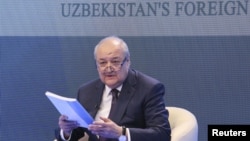Uzbekistan has no plans to rejoin a post-Soviet security bloc led by Russia, Uzbek Foreign Minister Abdulaziz Kamilov said on Wednesday, indicating the country's policy would remain the same despite a leadership change.
A former Soviet republic of 31 million, run by strongman president Islam Karimov from 1989 until his death last September, Uzbekistan has had a rocky relationship with Moscow, and by extension the Collective Security Treaty Organization (CSTO).
It suspended its membership in the bloc between 1999 and 2006 and then quit it altogether in 2012.
Following Karimov's death from a stroke and pledges by his successor, former prime minister Shavkat Mirziyoyev, to develop a strategic partnership with Russia, some have wondered whether Tashkent would rejoin the military alliance.
But, answering a question about it in a televised interview on Wednesday, Kamilov said, "The question of renewing our CSTO membership is not on the agenda.... There are no plans to discuss or review this matter in the future."
Russia has used the CSTO, along with the Eurasian Economic Union, another regional bloc focused on trade, to project influence across most of the former Soviet Union. It regards Central Asia as an area of strategic interest.
But only three out of the region's five nations - Kazakhstan, Kyrgyzstan and Tajikistan, whose combined populations are smaller than that of Uzbekistan - are CSTO members.





